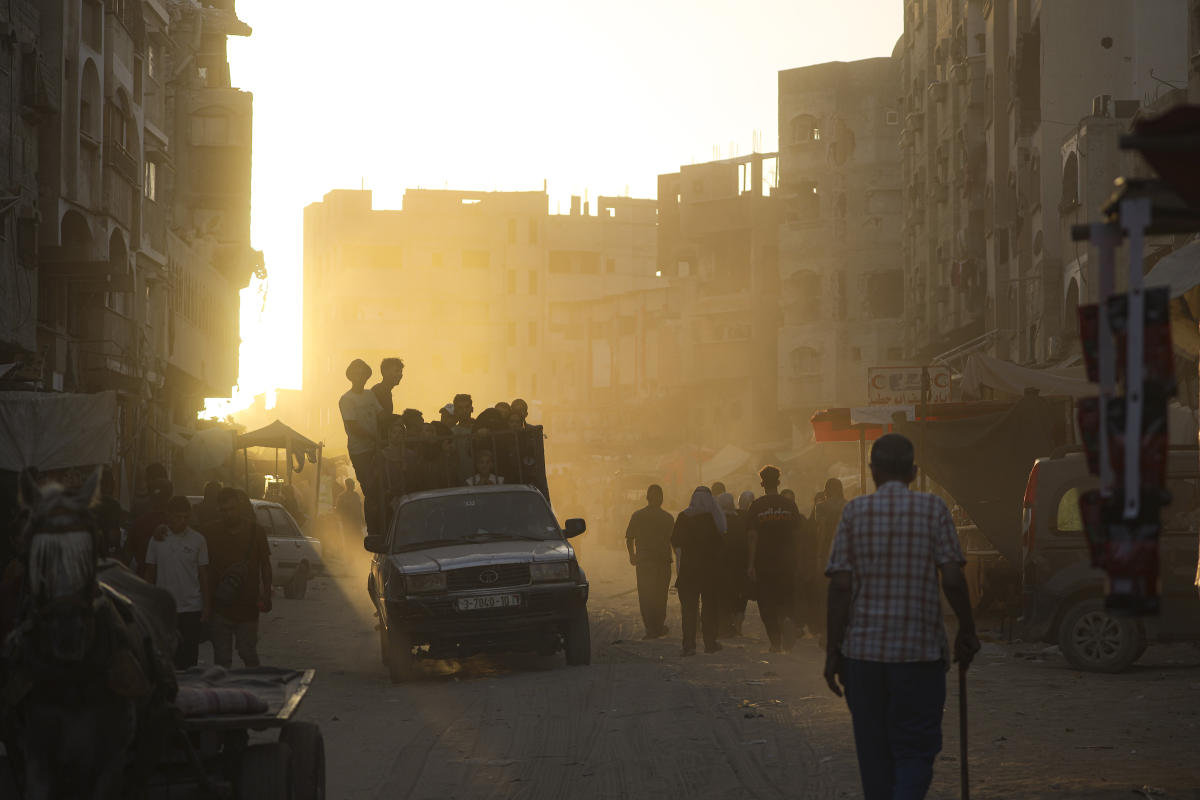President Joe Biden on Friday pushed for a new ceasefire that would include a hostage swap and an end to Israeli hostilities in Gaza, criticizing some Israeli leaders who he said wanted to “keep fighting for years.”
The president’s comments seemingly left the door open for Hamas to remain the governing authority in Gaza — a sticking point for Israel, which has rejected ceasefire deals that did not involve destroying the group or removing it from power. However, Hamas has said it will not participate in negotiations during Israeli military operations said Thursday that it was “prepared to reach a comprehensive agreement” that included an end to the war.
On Friday, Israeli officials said confirmed that the country’s armed forces were on the ground in the center of Rafah, a southern city that had previously become a refuge for hundreds of thousands of Palestinians fleeing Israeli forces advancing in the north. Biden had previously said an invasion of Rafah would mark a red line that, if crossed, would cause the United States to stop supplying weapons to Israel, but he made no mention of such a line on Friday.
More than 36,000 Palestinians have been killed in the war since October 7, when militants from the Gaza Strip invaded Israel, killing an estimated 1,200 people and taking hundreds of hostages. The toll of Israel’s military retaliation became even clearer on Sunday when an Israeli attack took place killed dozens of Palestinians take refuge in a tent camp in Rafah.
Israeli Prime Minister Benjamin Netanyahu has called that attack a “mistake,” but other Israeli attacks since then have had deadly consequences dozens more Palestinians in tent camps near a field hospital and a UN facility, which the constant danger to Palestinians, wherever in the Gaza Strip they flee.
Biden on Friday referred to “terrible images” of the aftermath of Sunday’s strike in Rafah, but reiterated Israel’s claim that it had targeted Hamas. He also acknowledged that “thousands of children” had been killed in Gaza.
The deal Biden outlined was similar to those proposed in the past that would have released hostages held in Gaza and Palestinians imprisoned in Israel. However, apart from a brief period in November when such an exchange took place, negotiators have not agreed on terms for a pause or end to the fighting.
The president introduced the plan by saying Israel had offered it, but later said he had “urged leaders in Israel to get behind this deal.”
The deal Biden outlined Friday included a six-week temporary ceasefire and the withdrawal of Israeli forces from populated areas of Gaza, which would in turn culminate in a full withdrawal of Israeli forces and “the permanent cessation of hostilities” if the deal were to proceed as planned.
In return, he said, prisoners in Gaza, including Americans, would be swapped for Palestinian prisoners held in Israel. Initially, that exchange would include “women, the elderly and the wounded, in exchange for hundreds of Palestinian prisoners.” Ultimately, he said, the swap would also include male Israeli soldiers and the remains of dead hostages. A “wave” of humanitarian aid would begin “immediately” if the deal was approved, Biden said, and Palestinians could “return to their homes” across the Gaza Strip.
“There are a number of details that need to be negotiated” between the first and second phases of the deal, Biden acknowledged, before saying the ceasefire would continue as long as negotiations were ongoing. The third and final phase of the deal would include “a major reconstruction plan” for Gaza and the eventual return of any hostage remains.
Hamas’s future is vague under the deal
Biden said at the start of his brief remarks that one of the principles guiding America’s role in the ceasefire negotiations was creating “a better day-after in Gaza without Hamas in power.”
However, he did not say that the deal he outlined would require Hamas to resign its power.
“At this point, Hamas is no longer able to carry out another October 7, which is one of the Israelis’ main objectives in this war, and frankly a just one,” Biden said, after describing Hamas forces as “destroyed” had described. by Israel. He said that any future “reconstruction of Gaza” would take place “in a way that does not allow Hamas to rearm.”
He said separately that “Israel will always have the right to defend itself against threats to its security and to bring to justice those responsible for October 7. And the United States will always ensure that Israel gets everything it needs to defend itself. If Hamas fails to meet its obligations under the agreement, Israel can resume military operations, but Egypt and Qatar have assured me, and they continue to work to ensure that Hamas does not.”
In fact, Hamas’s status in Gaza – and not simply its ability to launch another massive ground attack against Israel, as happened on October 7 – is a major bottleneck in previous attempts to reach a ceasefire.
Earlier this month, reports indicated that Hamas had agreed to a ceasefire agreement that included a hostage exchange and the gradual withdrawal of Israeli forces from Gaza, but that Israel had rejected the agreement because it allowed Hamas’s continued existence. Netanyahu said at the time “Israel will not allow Hamas to restore its regime of evil in the Gaza Strip. Israel will not allow it to rebuild its military capabilities.” Netanyahu previously said“The day after is the day after Hamas. All of Hamas.”
Notably, after Biden’s speech, an English-language statement from Netanyahu’s office reiterated Israel’s demand that Hamas’s “governance capabilities” be destroyed along with its military capabilities — a demand that Biden had not spelled out in his own remarks.
“The government of Israel is united in its desire to return the hostages as quickly as possible and is working to achieve this goal,” the statement said. “The Prime Minister authorized the negotiating team to present a proposal to this end, which would also allow Israel to continue the war until all its objectives are achieved, including the destruction of Hamas’s military and administrative capabilities. The actual proposal submitted by Israel, including the conditional transition from one phase to the next, allows Israel to uphold these principles.”
Hamas said in a statement that it viewed Biden’s speech “positively” and would work on “any proposal based on a permanent ceasefire, complete withdrawal from the Gaza Strip, reconstruction, the return of the displaced to all their homes and the completion of a serious prisoner exchange if the occupation is explicitly committed to doing so,” said Barak Ravid of Axios.
Biden criticizes hardline Israelis
The president also criticized hardline Israelis in his remarks, saying they were pushing for “years of” fighting.
“I know there are people in Israel who will disagree with this plan and will call for the war to continue indefinitely,” Biden said. “Some are even in the governing coalition. And they have made it clear that they want to occupy Gaza, that they want to keep fighting for years, and that the hostages are not a priority for them.”
“Well, I have urged leaders in Israel to stand behind this deal no matter what pressure comes,” he said. “We cannot lose this moment. An indefinite war in pursuit of an unidentified notion of ‘total victory’ will only bog Israel down in Gaza, deplete its economic, military and human resources and increase Israel’s isolation in the world.”
For the long term, Biden said, Israel’s acceptance of the deal would lead to “a potential historic normalization deal with Saudi Arabia” — a priority for the Biden administration. HuffPost reported this.
Later in the speech, Biden referenced Hamas’ calls for a ceasefire, saying, “This deal is a chance to prove whether they really mean it.” He separately addressed “all those who want peace now” and urged them to put pressure on leaders to accept the deal.
Yet he made no mention of the conditions for US support – political, monetary or through military supplies – if Israel continued its military operations in Gaza.







